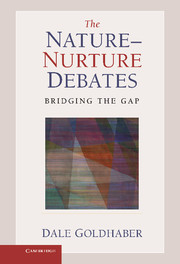2 - A Brief History Lesson
Published online by Cambridge University Press: 05 August 2012
Summary
One of the things that all students of human development are taught in their research methodology and statistics classes is that methodology and statistics are designed to be neutral, that is, the results of an experiment should reflect the data collected rather than how the data were collected or analyzed. This is the bedrock, the basis on which we claim our work to be objective, to be scientific. However, at least with respect to nature and nurture, and, in particular, the early history of the classic debate, this fundamental assumption simply doesn't appear to be true. In fact, most of the research methods and statistics used in the debate, then and now, evolved out of a desire of those whom we would now recognize as nativists to have an “objective” way of demonstrating the dominant position of nature over nurture rather than an objective means to assess the relative importance of the two.
Like just about everything in Western thought, this brief history lesson goes all the way back to the ancient Greek philosophers, Plato (437–347 b.c.e.) and Aristotle (384–322 b.c.e.). Today we would call Plato a nativist (Simpson et al. 2005), although it was not a term he made use of. Nevertheless, Plato argued that experience was simply insufficient to account for all the knowledge and abilities humans possess. Because these things cannot be taught, they must instead be present at birth, that is, they are innate. On the other hand, Aristotle, Plato's student, might have been the first empiricist, more precisely, possibly the first epigeneticist. As Anandalakshmy and Grinder (1970) explain it,
Aristotle described development as a process of continual integration and differentiation and insisted that the more complex growth patterns were irreducible to simpler elements or atoms. From the epigenetic viewpoint, maturity is not simply a summation of earlier structures but a novel synthesis of them. (pp. 1118–19)
- Type
- Chapter
- Information
- The Nature-Nurture DebatesBridging the Gap, pp. 14 - 36Publisher: Cambridge University PressPrint publication year: 2012



